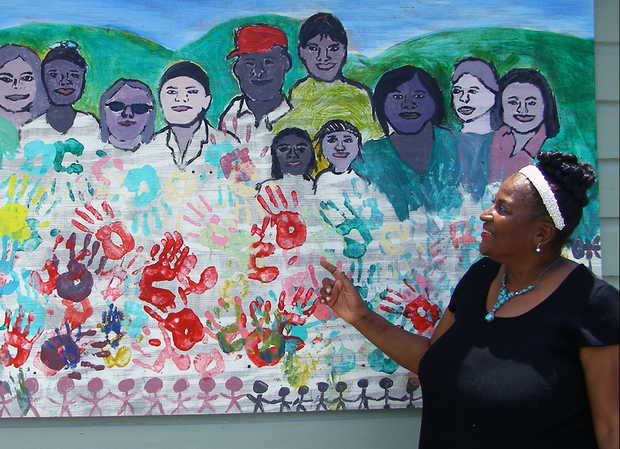By Lauren Walck
The Sun Herald.
BILOXI
Catastrophes have a way of changing plans, forcing people to step forward and act in order to survive.
For Sharon Hanshaw, stepping forward meant leaving her cosmetology career to become a community activist and international climate-change ambassador. She has met Desmond Tutu, traveled to Denmark, India and Brazil, and been featured in Lifetime Channel’s Remarkable Women campaign.
But that was never part of her plan.
Nine years ago, she owned Sharon’s Unlimited in East Biloxi, where she cut, styled and braided hair for 21 years. Hurricane Katrina wiped out the salon and everything around it in 2005.
“There was no house, no beauty salon, no car,” she said Friday, sitting in her office on Division Street.
She soon discovered tragedy was not necessarily the great equalizer it’s touted to be. Her community, like other poor and minority areas, remained on the same priority level it always had: last.
“I call it the left-behind community,” she said.
Like many areas of the Coast, its residents banded together to figure out what was needed and what to do about it.
She and about 50 other women started meeting at Richmond Funeral Home, the only building left standing. They became a group, voted on a name, Coastal Women for Change, and for Hanshaw to be executive director.
“It was just weird,” she said, because she didn’t know anything about bylaws or 501(c)(3) forms. But she got her college-educated children to teacher her to use a computer and began a trial by fire.
She said she stumbled a lot, but was determined to make a difference. She and others at the nonprofit found seed money, surveyed residents and started a program offering in-home child care.
Now CWC has a community garden, and programs that mentor youth at the juvenile detention facility, teach senior citizens to use computers and give backpacks full of school supplies to children in need. She said CWC gave backpacks to more than 900 children in 2013. She said supplies are still needed for this year’s giveaway July 26.
Determination is something that’s immediately evident in Hanshaw. With a little sass and a little encouragement, she tells everyone who walks through CWC’s door to get up and get to work. She prefers worker bees, not sittin’ bees, she says with a laugh.
“My philosophy in life is that if you’re here, you’re here for a purpose,” she said.
She and her siblings were working full shifts by about age 13 in their family’s eatery, the Kitty Kat Restaurant. Hanshaw said her father, a Baptist minister, instilled a work ethic in them.
After it was featured in a story by nonprofit Oxfam America in 2006, CWC became a partner organization. That’s how Hanshaw got involved with an Oxfam International program, Sisters on the Planet, which advocates for women, children and poor communities most affected by climate change.
In 2010, she became involved in a similar program called Climate Wise Women.
“The first thing I said is I’m not scientist,” she said, but she realized her experience with Katrina was something people could relate to. After her first trip to India with the group of women from all corners of the world, she realized her story was the same as theirs.
“I was like, ‘These women are just like us,'” she said.
One thing she didn’t expect, though, was women from third-world countries to at first be less sympathetic to her story. Hanshaw said they assumed because she lived in America she had free housing and an easy life.
And on the opposite end of the spectrum, women from other first-world countries would give her a pitying look when she said she was from Mississippi, which made her defensive.
buy zenegra generic buy zenegra online no prescription
“They learned so much,” she said.
Her goal, though, with both community and climate-change activism is to help the women around her.
“I’m trying to teach women to be their own voice and don’t let the world dictate what you can do and how you can do it,” she said.














































































































































































































































































































































































